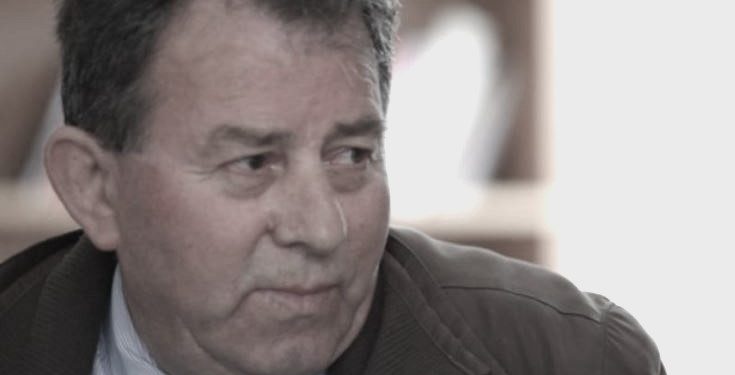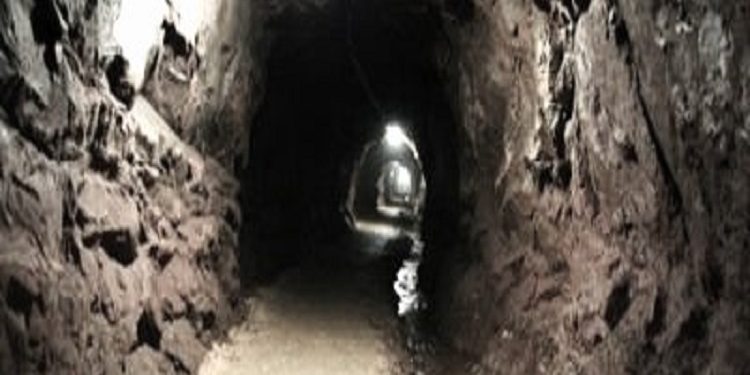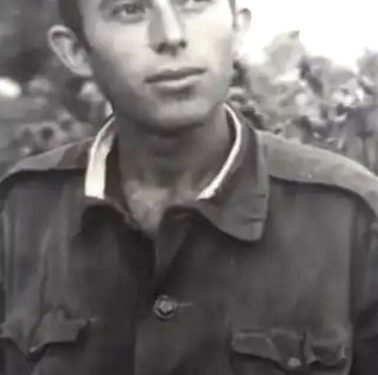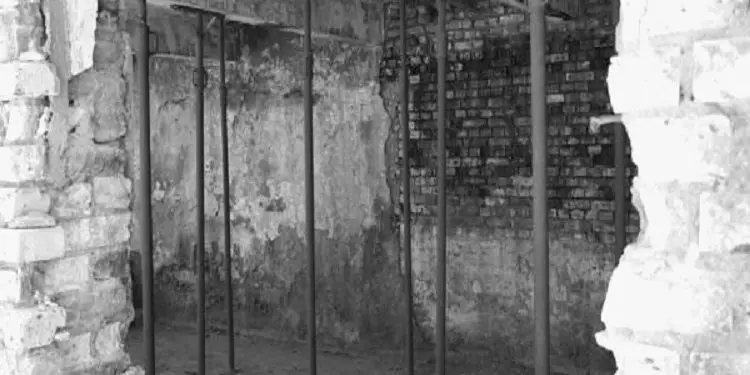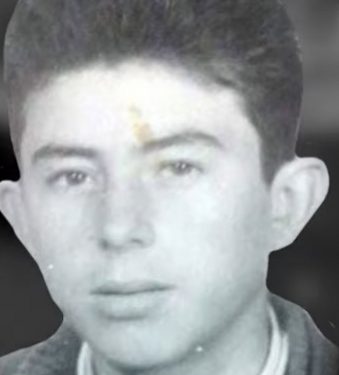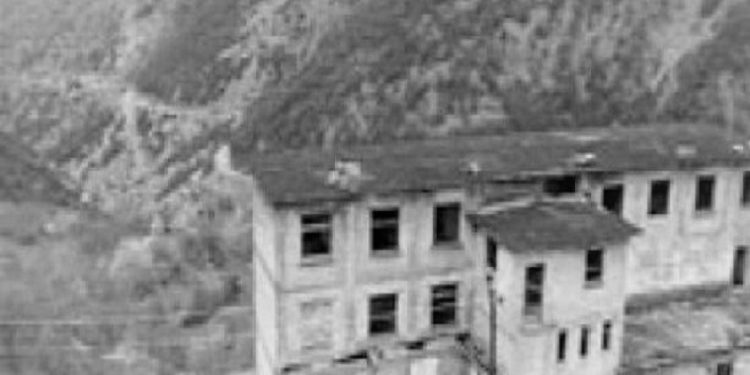By Shkëlqim Abazi
Part Eight
Memorie.al / I were born on December 23, 1951, in a dark month of a dark time, under the blackest communist regime. On September 23, 1968, the sadistic chief investigator, Llambi Gegeni, the vile investigator Shyqyri Çoku, and the cruel prosecutor, Thoma Tutulani, tortured me at the Branch of Internal Affairs in Shkodër, split my head open, blinded one of my eyes, deafened one ear, after breaking several ribs, half of my molars, and the thumb of my left hand. On October 23, 1968, they took me to court, where the wretch Faik Minarolli gave me a ten-year political prison sentence. After they cut my sentence in half because I was still a minor, sixteen years old, on November 23, 1968, they took me to the political camp of Reps, and from there, on September 23, 1970, to the Spaç camp, where on May 23, 1973, during the revolt of political prisoners, four martyrs were sentenced to death and executed by firing squad: Pal Zefi, Skënder Daja, Hajri Pashaj, and Dervish Bejko.
On June 23, 2013, the Democratic Party lost the elections, a perfectly normal process in the democracy we claim to have. But on October 23, 2013, the Director General of the “Renaissance” government sent Order No. 2203, dated 23.10.2013, for the “Dismissal from duty of a police employee.” So, Divine Providence intertwined with the neo-communist “Renaissance” Providence, and precisely on the 23rd, they replaced me with nothing more or less than the former operative of the Burrel Prison Security. Could anything be more telling than this?! The former political prisoner is replaced by the former persecutor!
The Author
SHKËLQIM ABAZI
Continues from the previous issue
REPS
(Forced Labor Camp)
Memoir
The Six Hundred Grams
(The routine of a day, in the dormitory camp)
By now, I had lost my identity; I no longer stood out from the others. I had taken on the color of the prison. I could rightly be called a number…! This color would cover my body and soul for five years. I started to itch all over; maybe the soap and the coarse canvas of my underwear were causing an allergic reaction. I joined the old men who had formed a circle near a fire pit. Someone handed me a white paper.
“Wear this, your head is steaming, and you’ll get cold!”
“A white hat?” I looked at it with curiosity, and then put it on my head.
I don’t know what I looked like at that moment, but I saw that the others were laughing.
“Now you’ve become mottled, son! A white head, a brown body!” the one who offered me the hat teased.
I ignored their laughter and headed toward the barracks. At that moment, I heard the Lab from behind me call out:
“Don’t be late, the porridge is ready!” when I turned my head, he added: “Hurry, hurry, but don’t be late!”
In the upper square, I almost bumped into my friends who had traveled with me from Shkodër. Loaded with a bundle on their backs, they showed me where to go to get what belonged to me. I went straight toward a building like all the others, which must have been a warehouse. A man in his forties stood at the door and motioned for me to approach.
He started walking in front of me, but from the first steps, I noticed that he walked with short hops, as if he was skipping. He limped.
“Are you one of the young ones from last night?” he suddenly asked.
“Yes,” I replied.
“Well, come on, then, to get your supplies!” he invited me, and limping, he went inside the barracks.
I followed him. As soon as I set foot in the warehouse, a heavy smell pierced my nose. I couldn’t identify what the smell was, but it was unbearable. The cripple, who seemed to have sniffed out my hesitation, turned to me:
“Why are you making a face, huh? Were you expecting the smell of lavender?” he mocked me in the Korça dialect. I didn’t answer; I handed him the slip of paper and waited.
“Why are you so upset, huh? Well, it’s moldy in here, my friend!” he added and hopped further in. He rummaged through a shelf and turned back to me:
“Hey, you look very young! How old are you?”
“About seventeen.”
He fell silent and looked me over from head to toe.
“And where are you from, huh?”
“Berat.”
“How long were you sentenced for?”
“I wasn’t sentenced, I was condemned,” I replied bluntly.
“Oh, why are you getting upset, huh? I didn’t kill you…! Okay, how long were you condemned for?”
“Five years.”
“I’m sorry. Eh…!” The cripple paused. “Eh, eh-hh! Oh, the world, oh, the world, one’s trouble is not like another’s!”
He moved a little further away, rummaged through a pile of tattered clothes, and turned back to me:
“I was put inside when I was your age, too, but it’s been years for me here! I have about a month or so left, but where will I go, huh?! Internment awaits me in Myzeqe, where they have sent my family!” He fell silent again and, hopping, went to the darkest corner and came back with a folded piece of clothing that was impossible to tell what it was.
“Say thank God, you’ve made it to this day!” I said out loud, but his words were stuck in my mind like nails.
“Well, how did a person end up like this? A hollow reed, without a core! Oh, the devil, to have been waiting for the moment of releases from prison for years and not feel a bit of joy! This poor guy, he likes the cage! He seems to not know where to go outside the cage! Ah, prison, oh prison, how you will turn me into after five years?!”
“Listen to me, huh, I swore not to mix with the young ones, but since they put me in here when I was your age, and since I’m in my last days, I’ll give you a couple of pieces of advice, if you’ll listen.” He fell silent again, this time a little longer, and then he fixed his feverish eyes on me.
“You can’t live here without friends, but be careful with the friendships you make, because they’ll exploit you for the wrong reasons. What don’t you find here, huh? There are all kinds of people! You’ll find spies, you’ll find immoral people, you’ll find scoundrels, and you’ll find people who are sick in body and mind! You’ll find them all, don’t trust everyone!” He took a deep breath, looked at me from under the brim of his hat, and continued:
“However, the majority is suffering and honest people—” he paused again, then with a gloomy face: “I’m not telling you to be alone, no, because the wolf will eat you! But try to get to know the righteous and honest ones yourself! Don’t let your mouth run with anyone until you’re sure you’re dealing with honorable people, then see what to do!—” he hopped further on, then turned back to me:
“Do you see your camp command? They don’t mind putting you in for a second and third time! Oh, e-e-eh, from five, you end up with twenty, like me! They will provoke you, so try to avoid them! Listen to some, don’t listen to others, be deaf in one ear and blind in one eye, and move on! But, if you see trouble, take care of yourself! If they stage unpleasant situations for you, try to deal with them! Did you understand, hey?”
He hopped over to the other side once more and stood face to face with me:
“So many young people here, brother, couldn’t resist the violence and pressure and in the end, either they sided with the command, meaning: they became spies and immoral, or they threw themselves into the wires on purpose and ended up as corpses. They are masters at this, huh!”
“I don’t understand, why are you telling me all this?” I interrupted the cripple’s monologue, because I was afraid he was provoking me.
“Ehu-uu, what my eyes have seen in all these years!—” the cripple continued. “Even I wasn’t like this, like you see me today? No, I wasn’t crippled, but young and strong like you! But I loved freedom; I couldn’t stand being in prison!”
“Ah, brother, who doesn’t love freedom?” I let out a deep sigh.
But he continued his monologue, without listening to me:
“I escaped from the Rinas camp with a friend of mine from Kukës, they wounded us, and they caught us, and now look at the state I’m in, a wreck. The day of release is approaching, but where will I go to die, huh? The way I’ve been ruined, I’m not even good for myself, let alone my family!”
“Don’t get discouraged; after all, life is beautiful!” I tried to give this unfortunate soul some courage. I thought that this middle-aged man, who was, in a way, confessing to me, needed a warm word. Even though I was not the most suitable person in this situation, because I had just stepped inside this enclosure of three layers of barbed wire, I did not hesitate to be there for him.
“A person should enjoy life and build it, in every circumstance, even when it seems impossible. I don’t believe you are an excess for your family!”
“No, I didn’t mean that! I just said that I am crippled and it is difficult to support a family in my condition,” he said, his face red, breathing with difficulty; the rattling that came from his throat was audible to me. “But anyway, let’s leave these conversations! Because instead of me giving you courage, it seems my heart is failing, and you are giving me some.”
“I don’t know why you told me all this?” I asked again.
“Why did I tell you? Where did I know you? Nowhere, huh! But when I saw you with Uncle Daut and Father Vaska, who are my old friends, something clicked in my mind. Besides, who better than you, who just set foot here, would I tell this to! Why, would I take it with me? No, huh, no, and where would I take it, huh? Where they will take me, it won’t be useful anymore, but maybe it will be useful to you!”
“Thank you!”
“I thank you for listening to me! Now that I’ve emptied it, I feel at peace!”
“Even though I didn’t ask for it, I still thank you anyway!” I replied, hoping to get rid of this unknown talker as soon as possible.
“Anyway, for the sake of my friends, as long as I am here, you will have my support,” he concluded and lifted a sack full of straw. We took it outside.
Meanwhile, the cripple returned to the warehouse, took two tattered blankets from a shelf, and from another, two brown suits, a pair of rubber sandals, two pairs of socks, two shirts, two pairs of trousers, and rolled them up on top of the mattress.
“Take these; this is your prison dowry!”
He filled out a receipt with a copying pencil and placed it in front of me for my signature.
I signed. I tried all the clothes tightly with the sleeves of a jacket and started to leave.
Before taking two steps, I remembered that I was leaving without learning the name of that storyteller. I put the bundle back on the ground, approached the warehouse door, and asked the cripple:
“I’m sorry, but I didn’t even learn your name! What do they call you?!”
“Emin Shehu, I’m from the villages of Korça.”
“Thank you, Emin, I will never forget the help you gave me! I will be forever grateful!”
I felt sorry for this physically and spiritually crippled man at that moment, but when I met him a few more times, I would change my opinion; in fact, I would sympathize with him for his courage.
Later in Spaç, through his friend, Hysen Gjuta, with whom I spent several years in the mines, I learned about the history of their sensational escape from Rinas.
But on the day he was released, I was not lucky enough to see him off; at that time, I was going through the “trial bench,” in the camp cells. But anyway, he made me the heir to the wealth he had accumulated during the years of his imprisonment; he left me all the cooking utensils.
In memory of the pain of that child who became a man and was mutilated by the communist prisons, I kept them until the day of my release from prison. On that day, in accordance with his will, I gave this inheritance to another man from Korça, Gëzim Medolli, who would use the utensils with the inscription “Emin Shehu,” until the end of the eighties.
I threw the bundle of clothes onto the bed. I didn’t have time to organize them because the Lab was waiting for me. He led me toward the private kitchen, where on two pieces of brick, Uncle Esheref, Sulua, and Vaska had taken their places. In the middle, on a sheet of plywood, they had placed a sooty black pot.
Next to them, the Lab and I sat down. Vaska took off the lid of the pot, and the fragrant steam rushed out forcefully. The aroma of oil and hot pepper tickled the insides of my nose, intoxicated me, and made my mouth water. It had been a long time since I had eaten warm food; the disgusting muck they gave us in the cells, a black liquid with no identity, was always cold.
With a wooden spoon, which would later become my property, I went straight for the pot. You couldn’t dream of plates there; this luxury was missing for almost all Albanians, even outside, let alone for us in prison.
The porridge tasted extraordinarily good. I can’t find another dish that I have later craved to compare it to! Of course, I was hungry, so the old men put their spoons aside, with the pretext that if they ate more, it would weigh down their stomachs.
They urged me to eat. “Go on, boy, you’re young, you have a strong stomach and a good appetite! And long isolation has tired you, and you need food. We can only eat this much, son, we’ve grown old!”
I ate what was left in the pot. Did I get full? I don’t know! Maybe the time in the cells had created an endless pit inside me that I didn’t believe would ever be filled. I thanked my friends for the honor they did me.
As I would learn later, being invited to a meal was a special honor that could be reserved for a newcomer, and I had benefited from this. Now I had to prove myself worthy, to justify the respect. Time would tell. The nightmarish state caused by hunger, for all those who had gone through the ordeal of the interrogation, turned into a nightmare.
Through food, the State Security aimed to break the victims, to soften them, like a wolf caught in a trap, which they leave without food until its strength is depleted. In the fight against hunger, the wild beast ends up either as a hunting dog that licks and wags its tail in front of its master, or suffocated in the trap.
What torture cannot achieve, the stomach often accomplishes. An empty stomach, after eating itself, gnaws at the soul and sends signals of horror to the brain.
Gluttony turns into an obsession that eclipses sight, darkens reason, and sinks even the most optimistic person into deep depression. It resembles a giant mill, who’s grinding stone turns without stopping and, under the terrible weight of its own stones, grinds down characters, even those of the highest caliber.
Only an iron will can withstand extraordinary situations. I have seen giants, with athletic bodies, who after more than twenty days on a hunger strike, turned into skeletal frames, their eyes faded and sank deep into their sockets, evoking pain.
As a result of hunger, I have heard screams of horror that made the dome of the Shkodër cells echo. Hunger weakens not only the body but also logic and morality. Individuals with weak character have done terrible things for a little material gain.
In prisons and camps, alliances were formed and dissolved between the strong and the wretches who sought protection. Just for a crumb of food, old and new friendships were created and eliminated. But the unyielding characters managed to resist the temptation to the point of sublimity.
During those years, I met prisoners without any help, always hungry, who to increase their food ration even a little, performed various services; they sewed, cooked, knitted sweaters and socks; they washed the clothes of others, especially the elderly, in exchange for a minimal reward, a handful of sugar, macaroni, rice, a pack of cigarettes, a bread ration, a ladle of soup, etc.
But there were also those who waited by the cauldron, hoping for something to be left over, or rummaged through the garbage cans for a thrown-out crust of bread that they collected, dried, and later soaked in soup broth, or simply in warm water and salt. However, these belonged to the most honest part, since there were also those who stole.
The day was coming to an end, as the slanting sun from the celestial dome poured out its winter rays. In the nooks, where the wind couldn’t reach, it was warm. We took a sheltered corner next to the wall of the food depot. Leaning against the canvas, my eyes were closing; the strong sunlight blinded me.
After so many months in the dark cells, now, washed and fed, I was enjoying the warm rays. My body felt numb, my vision blurred, the universe was spinning along with the buildings that were constantly shifting and changing position. I felt a relief; it felt as if I had taken flight toward some lands of fairy-tale charm.
I tried to get up, my knees buckled; they were shaking and not obeying me. I felt dizzy, almost lost control, and nearly fell to the ground. Memorie.al




